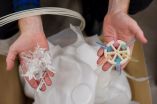Treatment of substance abuse can lessen risk of future violence in mentally ill
2014-10-01
(Press-News.org) BUFFALO, N.Y. — If a person is dually diagnosed with a severe mental illness and a substance abuse problem, are improvements in their mental health or in their substance abuse most likely to reduce the risk of future violence?
Although some may believe that improving symptoms of mental illness is more likely to lessen the risk for future episodes of violence, a new study from the University at Buffalo Research Institute on Addictions (RIA) suggests that reducing substance abuse has a greater influence in reducing violent acts by patients with severe mental illness.
"We were surprised to find that the severity of the patient's psychiatric symptoms was not the primary factor in predicting later aggression," says Clara Bradizza, senior research scientist at RIA and co-author of the study. "Rather, the patient's substance abuse was the factor most closely associated with future aggression."
A downloadable photo of Bradizza is available here: http://www.buffalo.edu/news/releases/2014/09/059.html.
Although the vast majority of people with mental illness do not engage in violent acts, the risk of violence is greater among the severely mentally ill than among the general population, and the connection between severe mental illness, substance abuse and aggression is a significant concern for community safety, treatment programs and public policy.
"Our findings suggest that treatment attendance is very important for these individuals and treatment programs should include interventions that are likely to decrease substance abuse, as this may provide the additional benefit of reducing the risk of later aggression among dual-diagnosis patients," Bradizza says. "This not only improves the lives of affected individuals and their families, but also provides a safer environment for society as a whole."
The study, funded by a grant from the National Institute on Alcohol Abuse and Alcoholism, followed nearly 300 patients over a six-month period following admission to an outpatient dual-diagnosis treatment program that provided both substance abuse and mental illness treatment.
INFORMATION:
The results appear in the current online edition of the Journal of Substance Abuse Treatment. The study's co-authors are Yue Zhuo, PhD, of St. John's University and Stephen A. Maisto, PhD, of Syracuse University.
RIA is a research center of the University at Buffalo (UB) and a national leader in the study of alcohol and substance abuse issues. RIA's research programs, most of which have multiple-year funding, are supported by federal, state and private foundation grants. Located on UB's Downtown Campus, RIA is a member of the Buffalo Niagara Medical Campus and a key contributor to UB's reputation for research excellence. To learn more, visit buffalo.edu/ria.
ELSE PRESS RELEASES FROM THIS DATE:
2014-10-01
New Rochelle, NY, October 1, 2014—Regulation of the human immune system's response to infection involves an elaborate network of complex signaling pathways that turn on and off multiple genes. The emerging importance of long noncoding RNAs and their ability to promote, fine-tune, and restrain the body's inflammatory response by regulating gene expression is described in a Review article in Journal of Interferon & Cytokine Research (JICR), a peer-reviewed publication from Mary Ann Liebert, Inc., publishers. The article is available free on the JICR website.
In the Review ...
2014-10-01
COLUMBIA, Mo. – Relational aggression, or "mean girl" bullying, is a popular subject in news and entertainment media. This nonphysical form of aggression generally used among adolescent girls includes gossiping, rumor spreading, exclusion and rejection. As media coverage has illustrated, relational aggression can lead to tragic and sometimes fatal outcomes. Despite these alarming concerns, little has been done to prevent and eliminate these negative behaviors. Now, University of Missouri researchers have developed and tested an intervention that effectively decreases relational ...
2014-10-01
This news release is available in French and Spanish. The Commission for Environmental Cooperation (CEC) has released a comprehensive report on the changing face of industrial pollution in North America, covering the years 2005 through 2010. This is the first time an edition of the CEC's Taking Stock series, which gathers data from pollutant release and transfer registers (PRTRs) in Canada, Mexico and the United States, has analyzed North American pollutant information over an extended timeframe. To view the report, visit http://www.cec.org/library.
This volume ...
2014-10-01
Biological sensors, or biosensors, are like technological canaries in the coalmine. By converting a biological response into an optical or electrical signal, they can alert us to dangers in our external and internal environments. They can sense toxic chemicals and particles in the air and enzymes, molecules, and antibodies in the body that could indicate diabetes, cancer, and other diseases.
An optical biosensor works by absorbing a specific bandwidth of light and shifting the spectrum when it senses minor changes in the environment. The narrower the band of absorbed ...
2014-10-01
It's old news that open-source 3D printing has a lot going for it: it's cheap, green and incredibly useful for making everything from lab equipment to chess pieces. Now it's time to add another star to the 3D printing constellation. It may help lift some of the world's most destitute people from poverty while cleaning up a major blight on the earth and its oceans: plastic trash.
At the center of the movement is a new set of standards inspired by fair trade products ranging from diamonds to chocolate.
"We are creating a new class of material called ethical 3D printing ...
2014-10-01
Washington, D.C., October 1, 2014—Use of specific dietary supplements can have a positive effect on health care costs through avoided hospitalizations related to Coronary Heart Disease (CHD), according to a new article published in the Journal of Dietary Supplements(1). The article, "From Science to Finance—A Tool for Deriving Economic Implications from the Results of Dietary Supplement Clinical Studies," published by Christopher Shanahan and Robert de Lorimier, Ph.D., explores a potential cost-benefit analysis tool that, when applied to a high-risk population (U.S. adults ...
2014-10-01
Reston, Va. (October 1, 2014) – Researchers at Memorial Sloan Kettering found that PET/CT imaging of patients younger than 40 who were initially diagnosed with stage I–III breast cancer resulted in change of diagnosis. As reported in the October issue of The Journal of Nuclear Medicine, while guidelines recommend FDG-PET/CT imaging only for women with stage III breast cancer, it can also help physicians more accurately diagnose young breast cancer patients initially diagnosed with earlier stages of the disease.
Assessing if and how far breast cancer has spread throughout ...
2014-10-01
As the threat of antibiotic resistance grows, scientists are turning to the human body and the trillion or so bacteria that have colonized us — collectively called our microbiota — for new clues to fighting microbial infections. They've logged an early success with the discovery of a new antibiotic candidate from vaginal bacteria, reports Chemical & Engineering News (C&EN), the weekly newsmagazine of the American Chemical Society.
Matt Davenport, a C&EN contributing editor, explains that the human microbiota produces thousands of small molecules. Some have been discovered ...
2014-10-01
Here's another reason why it's a good idea to hit the gym: it can improve memory. A new Georgia Institute of Technology study shows that an intense workout of as little as 20 minutes can enhance episodic memory, also known as long-term memory for previous events, by about 10 percent in healthy young adults (see a video demo).
The Georgia Tech research isn't the first to find that exercise can improve memory. But the study, which was just published in the journal Acta Psychologica, took a few new approaches. While many existing studies have demonstrated that months of ...
2014-10-01
Materials – Vehicle Lightweighting ...
For about the price of leather seats, automakers can trim approximately 362 pounds off the body and chassis of a midsize passenger vehicle, according to an Oak Ridge National Laboratory study. Researchers analyzed an array of materials – carbon fiber, advanced high-strength steel, aluminum alloys, magnesium alloys – that could replace steel. While the carbon fiber composite option reduced weight by 35 percent at an additional cost of $1,317, a combination of advanced high-strength steel and alloys resulted in a 25 percent weight ...
LAST 30 PRESS RELEASES:
[Press-News.org] Treatment of substance abuse can lessen risk of future violence in mentally ill


